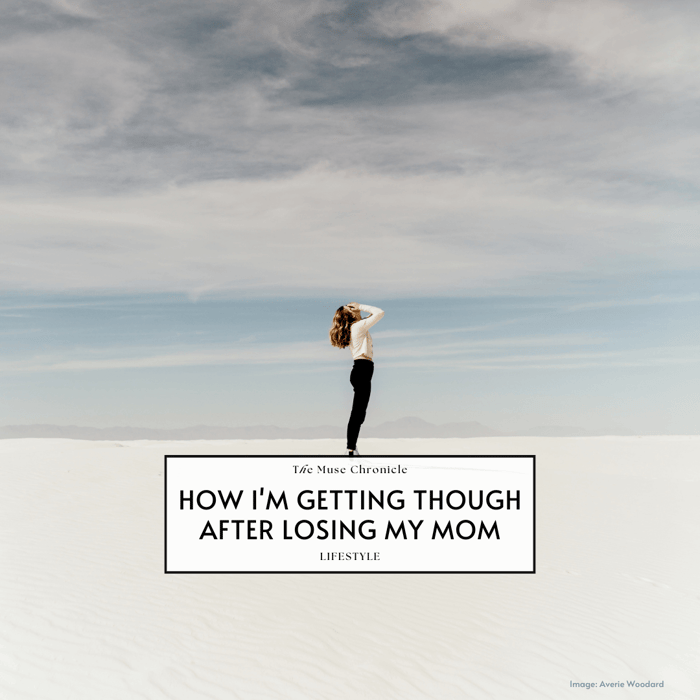The death of a loved one is one of the most difficult experiences a person can go through. Grief is at times intense sadness, anger, confusion, and a sense of loneliness. There is no right or wrong way to grieve, and everyone experiences it differently. I have lost people in my life, but the loss of my mom in 2022 has to be the hardest thing I have gone through. The saying "time heals" never made sense to me. It doesn't heal. It affects you deeply and alters the way you live. It becomes a new normal.
I am writing this article for myself and for anyone else who needs to know they are not alone in the crushing hurt of losing someone they love. I am a Christian and love Jesus more than anything else. As a very strong believer, even I am struggling with the pain. My mom is where we all want to be one day (in Heaven with God), and yet it's sometimes hard to be happy about that because my earthly being wants her here.
Why is grief so hard?
Grief is hard because it involves a loss. We are losing someone we love, someone who was a part of our lives. We are losing the memories we shared and the future we had planned together. It is a natural reaction to feel sad, angry, and lost when we experience a loss. It can often be hard to hold onto those memories or to fear that the memories will be gone too.
What does the Bible say about grief?
The Bible has a lot to say about grief. In the book of Psalms, we read:
"The Lord is close to the brokenhearted and saves the crushed in spirit." (Psalm 34:18)
"Blessed are those who mourn, for they shall be comforted." (Matthew 5:4)
These verses remind us that God is with us in our grief. He understands our pain and promises to comfort us. In John chapter 11, we see Jesus weeping over the loss of His friend Lazarus. Knowing that even the most perfect human dealt with sadness helps me take a deep breath. It's not lost on me that this story is told in the Bible. It's because God knew His children would suffer from losing loved ones.
Can grief make you sick?
Grief can sometimes lead to physical symptoms, such as fatigue, loss of appetite, and difficulty sleeping. These symptoms are usually temporary, but they can be signs that you are grieving. You've heard it before—'they are lovesick.' This also happens when someone you love leaves us. It's hard to eat, think of food, or even want to get out of bed. I've always found it interesting that people bring food to you when you lose someone you love, but you're not remotely in the mood to eat.
How grief can change you
Grief can change you in many ways. You may become more sensitive to the pain of others, or you may find yourself questioning your beliefs about life and death. You may also find that you are no longer the same person you were before your loss; this is all part of the grieving process. For me, it's a little different. My mom was a tough cookie. It sickens me to think about how hard I tried to make things right and how much of myself I emotionally invested, yet I was met with complete and total resistance. We had so many missed years. And now, here we are, and I'm still at a loss for how I could have made things better. What I can tell you is that I am determined to create a better life and home for my daughters. This is how grief changed me. I hold them much tighter than I ever would have before! So, there's a light and positive way for me to look at this.
How to cope with grief
There is no one-size-fits-all answer to how to cope with grief. The best way to cope is to find what works for you. Some helpful coping mechanisms include:
- Talking to someone you trust: This could be a friend, family member, therapist, or religious leader. Talking about your feelings can help you to process your grief and to feel less alone.
- Writing in a journal: Journaling can be a helpful way to express your thoughts and feelings. It can also be a way to track your progress as you grieve.
- Engaging in activities that you enjoy: This could be anything from spending time in nature to listening to music to reading. Doing things that you enjoy can help to take your mind off of your grief and to lift your spirits.
- Taking care of yourself: This means eating healthy, getting enough sleep, and exercising. Taking care of your physical health can help you to cope with the emotional pain of grief.
- Seeking professional help: If you are struggling to cope with your grief, a therapist can help you to develop healthy coping mechanisms and to manage your emotions.
The positive side of grief
Grief is a difficult journey, but it can also be a journey of growth. As you grieve, you may learn more about yourself and what is important to you. You may also develop a stronger sense of compassion for others who are grieving. Write down your memories as they come to you. This was my dad's advice to me, and I am passing it on to you.
Finding hope in the midst of grief
It is important to remember that grief is a process, and it takes time to heal. There will be good days and bad days, but eventually you will find your way through the pain. There is hope for healing and for finding joy again.
The importance of community
Grief is often isolating, but it is important to remember that you are not alone. There are people who care about you and who want to help you through this difficult time. Reach out to your friends, family, and faith community for support.
Grief is a journey, not a destination
Grief is not something that you ever fully get over. It is something that you learn to live with. There will always be times when you miss your loved one, but you will also find ways to celebrate their life and to move forward.
If you are grieving the loss of a loved one, know that you are not alone. There are people who care about you and who want to help you through this difficult time. Reach out for support, and allow yourself to heal.
Here are some books by great authors that may also delve deeper into healing from grief.





